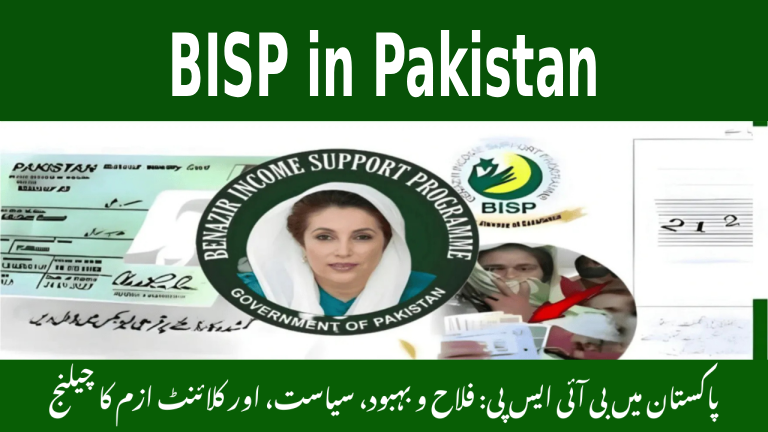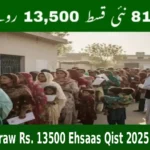
Introduction
The Benazir Income Support Program, or BISP in Pakistan, is one of the country’s largest social welfare initiatives aimed at alleviating poverty. Since its inception, BISP has played a critical role in supporting vulnerable families by providing financial assistance. However, the program is not just about welfare; it intersects deeply with politics and faces significant challenges related to clientelism. Understanding how BISP operates at these crossroads can reveal much about Pakistan’s social support mechanisms and political landscape.
What is BISP in Pakistan? An Overview of the Welfare Program
BISP in Pakistan was launched in 2008 to provide cash transfers to low-income families across the country. The program’s main goal is to reduce poverty and empower marginalized households, particularly women, by offering them a financial safety net. Eligible families receive stipends that help cover basic needs such as food, education, and health care. Over time, BISP has expanded its reach, making it a cornerstone of Pakistan’s social welfare system.
How BISP Shapes Welfare in Pakistan
The core objective of BISP in Pakistan is social welfare—focusing on poverty reduction and economic inclusion. By targeting over 5 million households, BISP helps millions escape absolute poverty and stimulates local economies through increased purchasing power. The program also promotes women’s empowerment since most beneficiaries are women, encouraging their participation in household financial decisions. This welfare initiative has been credited with improving food security and access to education for numerous low-income families.
The Political Dimensions of BISP in Pakistan
BISP is not just a welfare scheme; it deeply interacts with Pakistani politics. The program was introduced during a politically sensitive time and has often been used as a tool for political influence. Governments have utilized BISP to strengthen their voter base by distributing benefits in areas with strong political support. While this political involvement has helped maintain the program’s funding and momentum, it has sometimes raised questions about the fairness and neutrality of beneficiary selection.
Understanding Clientelism and Its Impact on BISP in Pakistan
Clientelism involves a political exchange where goods or services are provided in return for political support. In the context of BISP in Pakistan, clientelism refers to how local and national politicians may manipulate beneficiary lists or influence the distribution of funds to gain electoral advantage. This challenge impacts the program’s effectiveness by potentially excluding deserving families or including ineligible ones, thereby hampering welfare goals and increasing corruption risks.
Measures to Combat Clientelism and Improve BISP in Pakistan
Efforts are underway to curb clientelism within BISP in Pakistan by introducing transparency measures and technology. For example, biometric verification systems and centralized databases aim to ensure that only eligible recipients receive benefits. External audits and independent monitoring have been introduced to check manipulation. Furthermore, civil society organizations advocate for greater community involvement and more rigorous eligibility criteria to reduce political interference.
The Role of Technology in Enhancing BISP’s Welfare Role
Technology plays a vital role in modernizing BISP in Pakistan. Digital payment systems facilitate timely and secure cash transfers, reducing leakage and delays. Mobile banking and biometric authentication help verify beneficiaries, prevent fraud, and improve data accuracy. These advancements help strengthen the welfare impact by making the program more efficient and less prone to political manipulation.
BISP’s Social Impact Beyond Cash Transfers
BISP in Pakistan also invests in complementary programs aimed at long-term social upliftment. Initiatives such as interest-free loans for women, skill development programs, and educational scholarships complement the direct cash transfers. These efforts encourage financial independence and empowerment for marginalized groups, creating broader social change beyond immediate poverty relief.
Challenges Facing BISP: Political Dynamics and Clientelism Moving Forward
Despite its successes, BISP faces ongoing challenges due to political interference and clientelism. Political changes often bring uncertainty to program continuity and funding. Additionally, clientelism undermines public trust and threatens the program’s legitimacy. Addressing these issues requires stronger governance, institutional reforms, and sustained political commitment to keep BISP’s welfare mission focused and fair.
FAQs About BISP in Pakistan
What is the main purpose of BISP in Pakistan?
BISP aims to reduce poverty by providing direct cash assistance to low-income families, helping them meet basic needs and improve living standards.
How does politics affect BISP in Pakistan?
Politics influences the program through resource allocation and beneficiary selection, sometimes leading to favoritism or manipulation for electoral gains.
What is clientelism, and why is it a problem for BISP?
Clientelism is a system where politicians trade benefits for political support. It can lead to unfair distribution of BISP funds, excluding deserving families and enabling corruption.
How is technology improving BISP’s effectiveness?
Technology such as biometric verification and digital payments enhances transparency, reduces fraud, and ensures timely delivery of benefits to rightful recipients.
Can BISP help empower women in Pakistan?
Yes, since most BISP beneficiaries are women, the program promotes women’s financial independence and decision-making power within their households.
Conclusion
BISP in Pakistan stands as a vital welfare program with a profound social impact, lifting millions out of poverty and empowering vulnerable communities. However, its effectiveness is often challenged by political dynamics and the pervasive issue of clientelism. Addressing these challenges through transparency, technology, and strong governance will be key to ensuring BISP remains a fair, impactful tool for social welfare in Pakistan. Understanding these interlinked aspects helps us appreciate the complexity and importance of BISP in shaping the country’s future welfare landscape.

